#that death scene. jesus almighty
Text
ned chicane is sooo character. he's a skilled burglar but he's broke, he's a sensationalist and a cryptozoologist, he's a pathological liar who's just as persuasive when he's telling the truth as not, he refuses to harm a fellow human being, he runs a terrible and weirdly popular late-night TV show, he constantly tries to protect a town that does not return the favor, he is canonically in possession of george clooney's oscar, he's a self-declared coward who will always put himself in harm's way if it means protecting his friends, he has multiple fake IDs and passports and no one knows his legal name, he's the smartest dumbass you've ever met, he takes a bullet for dani as penance because hurting aubrey was his greatest regret even before they knew each other and he can't hurt her again, he can't let anyone get hurt again, he will not let someone else die because of him. he will not.
#i am putting him in a blender and drinking him like a smoothie#that death scene. jesus almighty#taz#taz amnesty#the adventure zone#the adventure zone amnesty#stuff#ned chicane#ned and aubrey is like. Such a tragic fucking relationship to me#ned duck and aubrey honestly feels like a daughter/uncle/granddad situation to me#and like. just. if i think about it for too long i go crazy
919 notes
·
View notes
Text
rewatching episode 9 is NEVER a good idea. especially not when you're not watching alone and so gotta act normal about it.
#you know what's the worst thing. its not even fitzy's death as in not the scene itself#its his ABSENCE in everything that comes after that really kills me.#there's no fitzjames. there's not even blanky (i may not cry at fitzjimbles's death scene but i will always cry#during that Laughing At The Funeral moment because jesus christ this is the worst this is the WORST)#crozier is alone. he's a single father of all these men now. there's just him. fitzjames and blanky were the last sources of comfort#(there is jopson but with him it's Different yknow) and they're both gone now. in just one day.#christ almighty this makes me wanna curl into a ball and cry. im losing my fucking mind just thinking about crozier in this situation.#also not to connect everything with MY blorbo but. its not a coincidence that crozier tries to comfort jopson with A STORY.#i am so. so. SO normal about the theme of stories in any media whatsoever#anyway.#on to episode 10 now. feel like biting just thinking about goodsir and the close up on the fitzchanel boots#the terror
3 notes
·
View notes
Text
When in Rome...
Lately I've been rotating the Rome scene in my mind like a rotisserie chicken. It's a very short one -exactly 1 minute of screen time- and yet it feels pivotal in showing the evolution of Aziraphale's and Crowley's relationship. It also includes some interesting references, and it just feels... different from the other flashbacks.
I've been thinking about it so much that I had to go back and rewatch the flashbacks leading up to it. Take my hand (take my whole life too) as I take you on a journey...
3004 B.C. - Mesopotamia
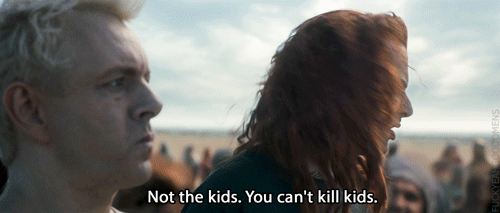
Aziraphale is the one breaking the news to Crowley: God, displeased with the humans, is going to wipe them out with a flood of catastrophical proportions. But fret not! He immediately downplays it: it's probably just the locals. And Noah's family and the animals on the ark are going to be fine. And then God will give them a "rain-bow"! Whatever that is, it's the promise it won't happen ever again.
That... doesn't sit too well with Crowley. "Not the kids! You can't kill kids!" he points out (does he mean human kids or goat kids? Probably both), and he scoffs at the rain-bow thing.
But quick comes Aziraphale's rebuttal:
You can't judge the Almighty, Crowley!
... perhaps too quick, like a line he's been fed and he internalized. Like he's subconsciously trying to justify God's actions to himself, more than to Crowley.
As it starts to rain, the crowd around them stands unaware of their own imminent fate.
2500 B.C. - The Land of Uz

Aziraphale learns, very much to his disbelief, that despite Job being a good man, his fate has been determined by a bet between God and Satan.
Here, he gets both to see Job's despair first-hand, and to exercise his own free will.
He teams up with the "enemy"; he lies to Gabriel; he gets a taste of self-agency and a taste of the oxrib (aka worldly pleasures). He gets to do the right thing and save the kids (human and goats alike), learning in the process that his and Crowley's conditions are not too dissimilar: they both feel lonely.
By the end of it, Aziraphale is sure he will get punished by God.
And then... nothing happens.
33 A.D. - Golgotha
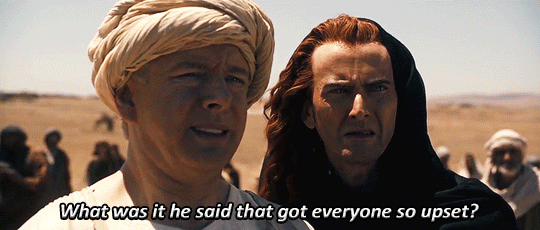
Aziraphale and Crowley witness the crucifixion of Jesus.
"Your lot put him on there."
"I'm not consulted on policy decisions, Crowley."
Unlike with Job, Aziraphale has no say and no power to stop what's happening. Despite that (and in contrast to the flood scene) he empathizes with Jesus: asking if Crowley knew him; recoiling as he watches him being nailed to the cross; acknowledging that all it took was him saying "be kind to each other".
Notice how the events shown in the flashbacks get progressively close and personal.
From the undefined crowd at the flood, to Job and his family, to this "very bright young man": yes, God has honoured the promise to not wipe humanity out ever again; that doesn't make the smiting/destruction/suffering any less painful and unjust.
There doesn't seem to be any logic, nor compassion, to God's decisions. There doesn't seem to be any immediate consequence, too, to going against them (if you're clever enough about it). I think that -as much as Aziraphale wants to keep believing in God's ineffable plan- he must feel, in some capacity, that it's all rather... pointless.
I think that here, in front of the grueling, graphic death of a single man, Aziraphale's moral journey reaches its (first?) breaking point.
In fact, where do we find him next?
"8 years later" (41 A.D.) - Rome

Aziraphale and Crowley meet again very shortly after - relatively speaking, at least (even the scene's title card highlights that: just "8 years later".)
This time around, there's no grand event happening: it's seemingly by chance, they run into each other in a tavern. Well, Crowley is there for "a quick temptation", which is not out of order considering the setting: Caligula's Rome, *the* time and place for decadence and dissolution. And Aziraphale?
He's just... there.
Well, in a scrapped scene from the script book he said he was there to "influence a boy named Nero, get him interested in music". But that didn't make it on screen - though maybe it's still relevant, as you'll see in a moment.
Thing is, he's been there for a while. Unlike Crowley with his odd-looking attire, Aziraphale blends in with the locals and with their customs: wearing a rather pretty tunic; toasting with a "salutaria"; playing a Roman board game by himself. Drinking wine and planning to check out "a new restaurant".
...if he's even talking about an actual restaurant, that is. It's all in this post (check out the comment section too) - but to sum it up: the first thing Aziraphale does is inviting Crowley out (actually, tempting him!) to try "Petronius' new restaurant". Petronius, the notorious "master of elegance" at Nero's court. And by "master of elegance", we mean he was in charge of everything concerning luxury, aka making the court's parties as lavish as possible. Petronius, who was described as a hedonist and an excess seeker. Aziraphale has heard "he does remarkable things to oysters". If that doesn't sound like tongue-in-cheek for some pleasure other than just food, I don't know what does.
In short, it looks like Aziraphale is on vacation, and a rather enjoyable one.
I think he's had about four thousand years to let everything sink in: where Heaven and Hell stand, God's plans and what they mean to humanity (and I'm not even considering what we didn't see: the first war, or Sodom and Gomorrah, or any other horror he might have witnessed).
I think that after Jesus' crucifixion, he was like: fuck it, where can I take a break from all this? Where's *the* place I can most indulge in... being as much human as I can get to be?
And of course he ended up right there. And as the saying goes... when in Rome, do as the Romans do.
I think Aziraphale is having his hot girl summer, and not even God knows what he's been up to.
#good omens#good omens meta#well “meta” might be a generous term lol. musings?#aziraphale#crowley#oh how I wish the Rome flashback showed us more#to be expanded on/continued? possibly ¯\_(ツ)_/¯
80 notes
·
View notes
Text
The Passion of Jimbriel
Part 3: Resurrection
Part 1: The Entry to Soho
Part 2: Trials and Denials
The story of events leading up to the crucifixion of Jesus, and the days following, until his ascension to Heaven, are collectively known as the Passion narratives. It comes from the Latin "to suffer," or "to endure."
In Part 1 of this series we looked at the three temptations in the wilderness during the 40 days of fasting, before the entry to Jerusalem on donkey. Then there was the Cleansing of the Temple and the Anointing of Jesus. I matched up the various scenes in S2 that mirrored these parts of the narratives.
In Part 2 we had the Last Supper, before moving to the Garden of Gethsemane and predicting the Three Denials. The burden of other's sin was taken on, the kiss of Judas was received and Jesus was arrested. Then there was a trial, the first of two, before the Three Denials actually happened. Now we are off to the palace to meet the Roman Governor of Judea.
Just a note: Part 3 isn't any easier than Part 2. Now is the time to save it to read for later, if you aren't in a safe place.
The Court of Pontius Pilate
Jesus is taken to Pilate to be judged again, as the priests want this troublemaker executed, but on questioning Jesus Pilate can find no fault with him. Pilate asks Jesus if he is King of the Jews, and Jesus replies "You have said so," which is not really an answer. Pilate is not sure what to do.
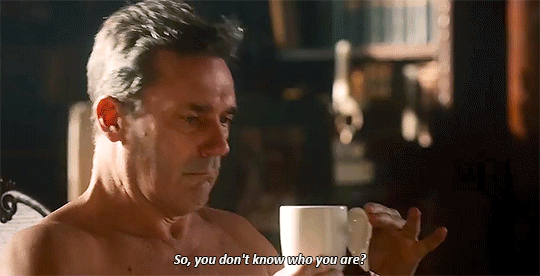
AZIRAPHALE: ...So, you don't know who you are?
GABRIEL: Oh, yes.
AZIRAPHALE: Ah.
GABRIEL: I'm me. I just don't know who me is.
AZIRAPHALE: I see.
GABRIEL: But you know me. You recognized me.
AZIRAPHALE: Well, I ah… know someone who looks like you.
GABRIEL: That's probably me then. I think that's one of the main ways you can tell.
Pilate can't see any reason to convict Jesus, since he does not lay claim to any earthly kingdom, only a spiritual one, so he sends him off to King Herod.
Herod questions Jesus as well, hoping to observe one the miracles he has heard about. He gets the same non-responses from Jesus, so sends him back to Pilate.
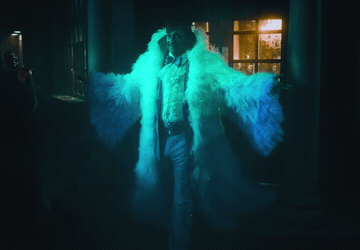

Hey, it's me! King of the Jews! Gabriel! Don't you recognize me?
It's also worth noting Jimbriel's actual pose as he exits the book shop and how he holds his fingers. He holds his pointer and middle fingers out, and curls his ring and little fingers in on both hands (and this is not the only time he does this in the series.) This is a classic "preaching" pose, and he is mimicking an iconic pose of Jesus here.
There is a small question about whether at this point in the narratives whether it is the soldiers of Herod that dress Jesus in the robes of a king to mock him at this point, or its done a little later, after the release of Barabbas, so lets just mention it here, as it seems to happen twice in our story.
It also might be worth taking a small digression about the performer Liberace here, who inspired the ostrich feather coat, and who reigned as a king of entertainers in the post-WWII era. He was famous not only for his over-the-top flamboyance (as well as being queer) but also for his signature candelabra. You know, one of these:

The Release of Barabbas
Pilate was in a bit of pickle now. He really didn't want to condemn Jesus to death, but the priests were still pushing him to condemn Jesus to execution, so he decided he would give the people the choice instead. He offered them the choice of releasing Jesus or a prisoner called Barabbas. Whether they were stirred up by the priests or not they had only one choice.
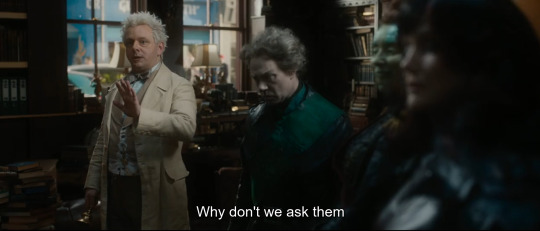

They chose...
Actually, I think there are two choices for the release of Barabbas here - one is Gabriel, as I will explain below, and the other one -
Release Bwian!
Er, release Barabbas Mr Brown!

Pick a card, Mutt? While you're dressed in robes that are a throw-back to biblical times? What kind of ineffable games are being played here by the Almighty?
The Way of Sorrows
(Also known as: The Stations of the Cross, The Way of the Cross)
Oh, yes, its this bit. And you thought it was just a bit of silliness.

Lead the way, soldier!
Some of the narratives have the Roman soldiers who take him from Pilates court strip him and robe him in either red or purple, give him a crown of thorns and call him "King of the Jews!" again in mockery before he is forced to walk to his place of execution.
Wait, who's execution are we walking towards again?
Crown of Thorns. ✅ Mocking garb.✅

I had already mused in the past that Crowley had dressed like this to mock the Archangels in my big colour meta (under silver,) and I have also bumped into pre-release comments that thought he was doing that as well, so I 'm glad to see I'm not the only one on this train of thought! He's gone a bit over-the-top with his outfit, which is similar to Saraqael's (a hint to the connection there) plus he has a tactical turtle neck on to go with his master spy work he's undertaking (but so does Saraqael!) It also tells us its a level of rank he's quite familiar with.
Oh, hang on. Gabriel didn't get away from doing anything here.
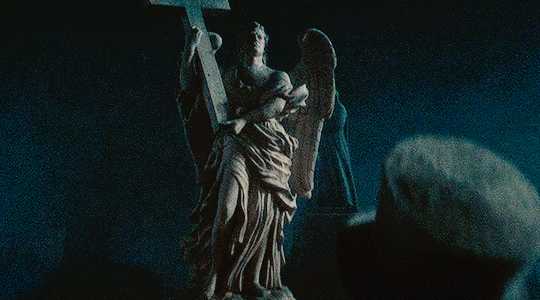
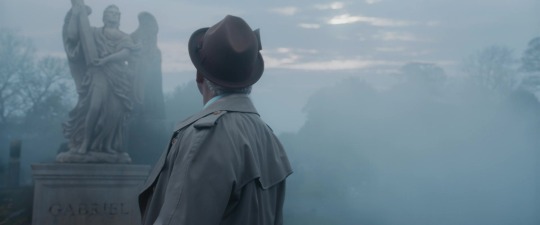

The Three Stations of Gabriel's Cross Bearing: The first in 1827, when Crowley shows it to Aziraphale on a midnight date, the second when Aziraphale comes across it again in the present - and tells Crowley "I think I've found some clues," and the third when we see Gabriel showing it off to Beelzebub.
OK, one more bit of mocking...

The Crucifixion
On arriving at the top of Golgotha, Jesus was stripped of his clothes and nailed to the cross. A sign was placed above his head declaring him the king of the Jews. On either side two other criminals were also crucified that day.
This is the one part of the narratives that did not fit into S2, so it got given to us separately.
In S1 we had the scene at Golgotha in S1E3 Hard Times, where we are shown Aziraphale and Crowley meeting to witness the event. Aziraphale remarks that he is "not consulted on policy decisions," while Crowley relates that he carried out the Third Temptation on Jesus not long before this.
A red cloth draped on the ground symbolizes blood in S1. In S2 we have red tomatoes spilling across the road as Gabriel walks past on his way to the bookshop. They take us back to S1 and tell us its repeating again. I would expect another iteration in S3.
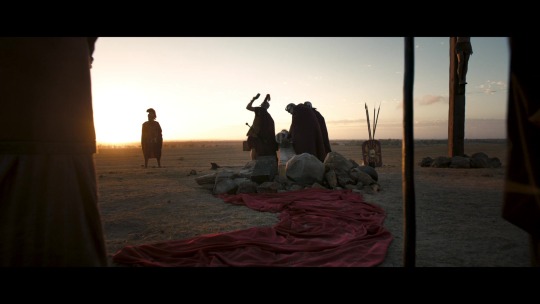

Then we have the two classic poses that were given to us, that are not in any scene from S2. When these were first released a number of ops posted about the similarity to the iconography of the Madonna and Jesus on the Cross.


On the left, is Aziraphale, posing as mother Mary, in the "Stabat Mater" pose, or "the mother was standing." This is Mary standing at the base of the cross, and she is traditionally shown on the left hand side. She is but a spectator to the scene.
On the right, is Crowley, posing as Jesus nailed to the cross. He is a sacrifice of one, to save many, in his present day costume.
What intrigues me is they chose to have Aziraphale wear his Job minisode costume for this shot. The angels were dressed in white and gold to show their "divine majesty," to fit in with the vivid 1950's style colouring. But it was also where he had to chose very carefully what he said, and he chose to lie to save lives.

A scene from the Job minisode, A Companion to Owls: Sitis and Job on the left - Sitis is Aziraphale-coded and Job is Crowley-coded. on the right are the divinely-glowing angels. Gabriel stands on the demonic-sided left of them, but Aziraphale is on the far left, the most demonic angel there. He was lying, after all, and that's what demons do, isn't it?
While Jesus is often called the Lamb of God, as sheep were considered more respectable to Christian ideals, and Jesus is said to have gone willingly to his death, it is perhaps a better way to consider what happened as the scapegoat ritual - where two goats are chosen, one is burdened with the sins of the group and released into the wilderness to take those sins with them and die, and the other to be sacrificed to God. In the Passion, it was Barabbas that was set free, and Jesus that was sacrificed.
The question then becomes how to view this through the lens of the Good Omens story. If we didn't get a crucifixion scene in S2, when is this occurring in the story? If Crowley is Jesus, who is Barabbas? If Aziraphale is Mary, just witnessing the execution, and not able to intervene...what could be the long term implications of that?
This is where I feel like I've done a Crowley on myself, spreading a field of sharp tacks across that shiny clean aisle in Heaven I was sauntering blithely down and stabbed myself unexpectedly in the foot.
Because the answer to the second question there is Barabbas is Gabriel. (hey, wot, didn't you say Mr Brown was Barabbas??) S2 spent quite a bit of time trying to tell us how similar Crowley was to Gabriel, and the two characters appear to be acting as "foils" to each other this season. Indeed, they have been interchangeable in their roles as Jesus throughout this three-part meta (thinking about another meta to expand on this.) And right at the end Gabriel gets to run away into the interstellar wilderness to ostensibly never be seen again - and Crowley stays to be emotionally slaughtered.

Which still leaves us with the first and third questions.
When did happen? The problem is, as already stated - this scene did not fit into S2, so we were given it separately. I know one could argue that the end of the above scene, and the following moments, could count as the crucifixion, as Aziraphale was bound seemingly helplessly by the manipulations of the Metatron to leave Crowley behind, and in doing so to sacrifice him for a greater good. This goes someway towards leaving Aziraphale as the witnessing Mary, but he is still far too involved for my liking here. And we've already put the label of Judas on him in Part 2 of this meta. He had to betray Crowley to get him to stay behind for his own safety.
The more likely scenario is then it happened in the past. I'm going to quote a passage from @vidavalor's meta "The *Original* Original Sin Theory as they say it best, really:
Aziraphale doesn’t need to see Heaven’s files to find out what happened to Crowley when Crowley fell because he was there. S3 is going to be about preventing the Second Coming and so plot allusions to the crucifixion (which had its own Crowley & Aziraphale scene in S1) will likely abound. Aziraphale was there when Lucifer and The Gang were tossed out of Heaven. To be fair to Aziraphale, there is basically nothing he could have done to prevent this and the best possible situation is that he didn’t even have the chance to. The worst possible situation is that he’s literally Judas and sold Crowley out, out of fear of being tossed out of Heaven himself. I tend to think it’s more that he just didn’t stand up and say anything in support of Crowley to prevent himself from being seen as on the side of the eventual demons. Still, just as Crowley thinks the punishment for Adam and Eve was harsh, Aziraphale thought that asking questions and being curious wasn’t enough to send Lucifer and everyone around him to Hell to be damned for all of eternity but it caused an obvious existential crisis in him that he still struggles to totally resolve.
And that is basically how I see it, too. Heaven (the Jewish priests), through the Metatron, wanted the inquisitive, questioning angel!Crowley gone, possibly because he'd found something he shouldn't have seen. Lucifer and the guys (Rome) didn't care much for angel!Crowley either, as I showed back in this meta, and were happy for him to be the scapegoat that got made an example of for punishment. And Aziraphale, as Mary, kept his mouth shut and just watched, because he wanted to be a good angel and not get thrown out of Heaven himself. Maybe he did know something that could have absolved angel!Crowley, maybe he lied to escape being thrown out himself, but what ever happened, he's been carrying a sense of guilt about it ever since.
As for Crowley, he was not a willing lamb at all. We see him question God about his fall, about testing Earth to the point of destruction and he gives the goats in the Job minisode a soliloquy about their impending doom that seems an obvious reflection of his own experience as a scapegoat.
Now we have the Second Coming in S3. Jesus will be back. So will mention of the crucifixion. There is still plenty of dirt to be dug up and aired on this yet.
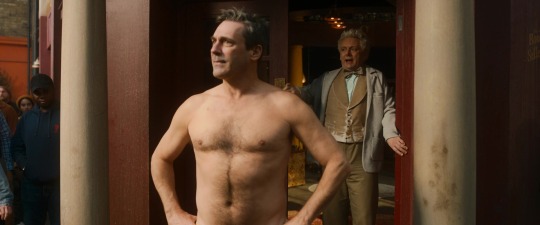
Maybe someone did die, after all...of embarrassment!
Burial of Jesus
Joseph of Arimathea was given permission by Pilate to remove Jesus' body from the cross, wrap it in white linen, and place it in a tomb. Even though Jesus was considered a criminal, he should still be buried before sunrise the next day.

I'm going to admit, this is the one bit of the narratives I'm not sure about. Was it the burying of Gabriel's essence in the fly? Or the burying of Gabriel's location under the 25 lazurii miracle?
There also a section called the Harrowing of Hell here, where Jesus was said to have descended to the Underworld, or Hell (because that is what Hell means, after all, the Underworld - that's why it's in the basement of the celestial corporate building!) and liberated those caught in Hell up until that time.
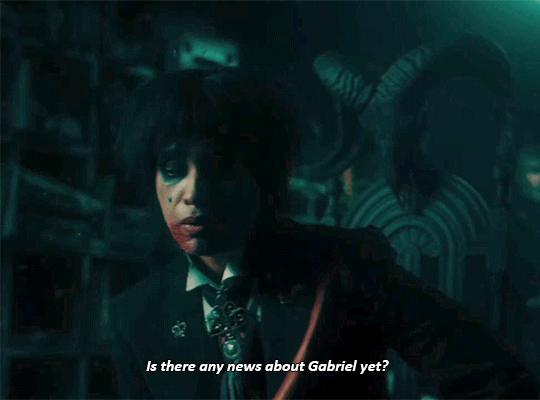
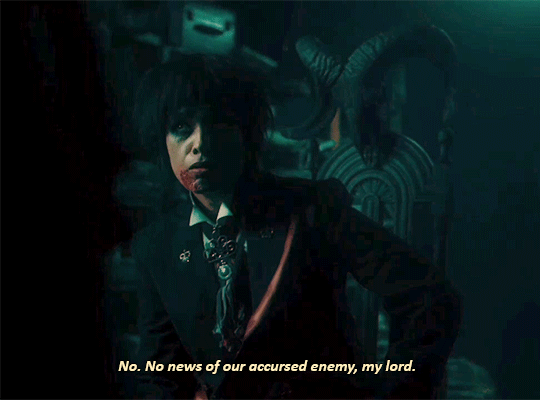
This could be why we get the scenes with Beelzebub stressing over the disappearance of Gabriel and lack an any sign of where he has gone. They look more "harrowed" as the days go on.
Resurrection
After three days, Jesus rose from the dead. This act is seen as a guarantee that all the dead (on the "right side" or those whose names are in the Book of Life) will be also resurrected when the Second Coming occurs. It is also known as The Parousia, which we see mentioned inside the cinema on the wall during the opening sequence in S2.

After three days, some women approached the tomb to finish preparing the body, because they had not been able to earlier due to the sabbath day occurring. As they approached, they found the stone that should have blocked the entrance rolled back, and an angel clad in white sitting there telling them not to be afraid, but to go tell others what had happened.
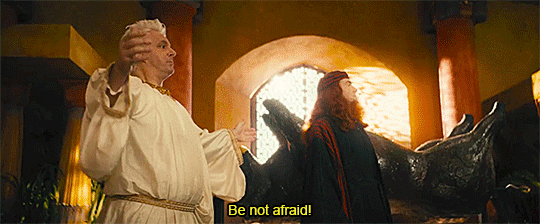
Well, Gabriel had left the building, but the last thing was they were going to do was tell everyone about it!
SARAQUEL: I don't trust him. Can we begin the memory wipe now?
MICHAEL: What, without him here? [nods] Good idea.
SARAQUEL: Right. I can't… I can't find his memory anywhere. In fact, I can't find him in the building. He's left Heaven. Should I sound an alert?
METATRON: Oh, don't be so wet. No, you're all just going to have to find him. That's all.
Humph. You're being the wet blanket, Metatron.
On one side of The Resurrectionist sign for the pub in Edinburgh we have Jesus standing outside his tomb. He is dressed in red and blue. The red represents his connection to humanity but he is wrapped in the blue of divinity. It looks like we are looking out of the tomb into the world. The entrance is supposed to match the "gate" of Eden that Aziraphale sent Adam and Eve through, so if it looks familiar, that's why.
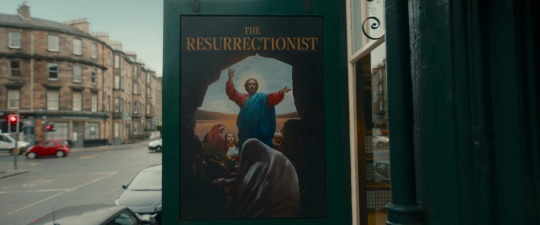
We something similar when Gabriel regains his memories from the fly. We start out with a red transition, then move towards blue as he regains his angelic divinity, then he is finally back as his lilac royal smugness self on the last.



I did take a very long look at @embracing-the-ineffable's The Ineffable Detective Agency's presents: Gabriel's Memory and the quick transition sections, but didn't come to any firm conclusions, other than the colours. Although this may be why Death appears four times.
Ascension to Heaven
Accounts vary - some say it was the same day, some say after forty days - Jesus ascends to Heaven.
See you later, guys!
You know you can never return, right? Right?
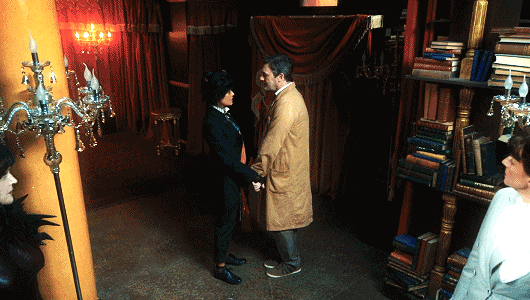
Um, so, what about this little thing called the Second Coming, then?
Wait and see? nngggkk...
Here endeth our journey through the Passion narratives.
#good omens#good omens 2#good omens meta#good omens analysis#aziraphale#crowley#gabriel#beelzebub#the metatron#saraqael#mr brown#the eldritch ball#liberace ostrich feather coat#jimbriel#the passion of jimbriel#the resurrectionists#job minisode
37 notes
·
View notes
Text
Ranking of Kings: Hell and Demons
Offered to Jesus through Mary
Matthew 22:13 “Then the king said to the attendants, ‘Bind him hand and foot and cast him into the outer darkness. In that place there will be weeping and gnashing of teeth.’”
Spoilers?
No big spoilers this time around. I’ll refer to one scene and one character out of context, but that’s all. If this whets your appetite for the show then go ahead and watch it. If not, then still give it a try. It’s a good show that keeps you hooked. Not to mention the second opening is a banger.
Our Topic
Towards the end of the show, we’re shown a depiction of hell where the souls of the damned are eaten, regurgitated, reformed, and then eaten again ad infinitum. If this reminds you of Dante’s Inferno, you’re not alone. Also, good job! Being well-read in literature guarantees you pick up on all the inside jokes and references people make. Setting aside the early Italian renaissance – what’s important here is that Hell isn’t just a fiery time out corner. The damned aren’t just thrown into Hell. They are actively punished while in Hell and they’ll be in Hell forever. This should properly terrify us. If we think the “sweet release of death” frees us from all our problems, we may be in for a rude awakening.

The unnamed demon eating someone’s soul.
But before we get too gloomy, let’s take a step back. Ranking of Kings did a good job showing us how horrific hell is. But if this article is going to serve a purpose, we should see how someone ends up in Hell. We could say ultimately this is done by rejecting salvation through Christ. That’s the general answer. For specific answers we can look at all the various ways someone separates himself from Christ. For now, I’d like to focus only on one way: pacts with devils. If we believe the rising statistics of people claiming to worship pagan gods, then we shouldn’t be surprised that more people – knowingly or unknowingly – are entering into pacts or contracts with devils.
In Ranking of Kings things are comically straightforward. Miranjo, a young woman, has made a pact with a demon who tells her upfront “when you die, I’ll devour your soul”. We might dismiss this and say “she was desperate, and it was for the sake of the plot.” That’s fine with me. I’m not trying to prove or disprove her character. Pay attention to what the demon says. It’s simplistic, sure, but the pact made between Miranjo and the demon demonstrates truths about our spiritual warfare this side of Heaven. Contracts are a two-way street. Each party does something for or to the other. But this doesn’t mean both sides are equal. In making a pact or contract with a demon, a human places himself under that creature’s power structure in the hopes that one metaphysically higher than himself can achieve what he cannot.
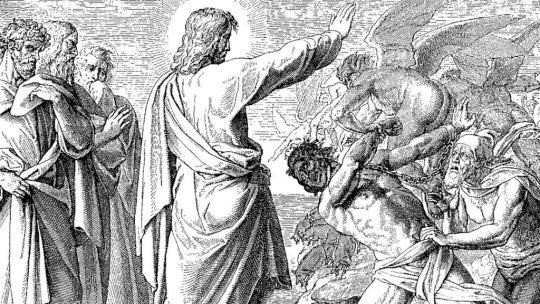
Christ casting out demons
Here’s the catch. Demons cannot guarantee their side of the bargain. All their actions are confined by the permissive will of God. They serve the father of lies, so why should we believe anything they promise?
Alternatively, the Paschal Mystery of Christ is what establishes a new covenant (i.e. contract) between God and mankind. In Baptism we die and rise with Christ. This takes us out from the domain and power structure of sin and death and places us in our Heavenly Father’s house. Only by our own free choices do we find ourselves outside such divine protection.
Okay, so what?
I don’t expect many readers to have experimented with occult practices. Again, good job! But regardless of our history, I want to recommend a simple practice: repeating the renunciations made at our Baptism. It’s a small way of reminding ourselves who exactly we’ve put our trust and hope in. Let us firmly say I do to the follow.
Do you renounce Satan?
And all his works?
And all his empty show?
Do you believe in God, the Father almighty, Creator of Heaven and Earth?
Do you believe in Jesus Christ, His Son, our Lord, who was born of the Virgin Mary, suffered death and was buried, rose again from the dead and is seated at the right hand of the Father?
Do you believe in the Holy Spirit, the holy Catholic Church, the communion of saints, the forgiveness of sins, the resurrection of the body, and life everlasting?
St. Justin Martyr, pray for us!
#catholicism#catholic anime#anime analysis#animechristi#ranking of kings#ousama ranking#hell#baptism
4 notes
·
View notes
Text
Devotional Hours Within the Bible

by J.R. Miller
The Ten Commandments (Exodus 20)
Mount Sinai became the meeting-place of God and the people of Israel. The Lord met Moses on the mountain and told him that He would reveal Himself in a thick cloud, and speak to him in a voice that the Israelites would hear. Solemn preparations were made for the great event. Bounds were set, inside of which no one should pass on penalty of death. On the third day, the promised revelation came. There were thunders and lightnings, and a cloud enveloping the mountain. Then out of the midst of the magnificent scene, God spoke to the assembly of Israel, the Ten Commandments as the basis of His covenant with them.
The commandments are of Divine origin. The Lord based the obligation of the people to obey these commandments, on what he had done for them. “I am the Lord your God, who brought you out of the land of Egypt, out of the house of bondage.”
Everywhere we find the footprints of God. Life is full of His goodness and mercy. When we think of what He has done for us we cannot but recognize His right to command us. All the hopes of the Israelites had come from God’s deliverance. Once they were slaves and He had set them free. Had it not been for His love for them, and His power put forth in their behalf they would still have been slaves in Egypt! He had redeemed them and now they were a free people, on their way to a land in which they would grow into a great nation.
“You shall have no other gods before Me.” The commandments are given in the second person singular, “ You shall.” God’s law deals with individuals and comes to each one personally and separately.
The first commandment requires that God shall have the first place in our life. The opening words in the Bible are suggestive: “In the beginning God.” We should put Him first and keep Him first in all our life.
Every person has some ‘god’. Our god is that which rules us, that which we love, obey, live for, and reverence. We talk with pity of the idolatry of heathen nations. But there are idolaters nearer to us than India or China. In whatever heart the true God is not worshiped, some false god is. Is the God of the Scriptures, indeed our God? Do we love Him above all persons and all things? Is He really first in all our thoughts, affections, plans and hopes?
It is not enough that we give Him the first place in our creed, saying: “I believe in God the Father Almighty, Maker of heaven and earth: and in Jesus Christ His only Son, our Lord.” If lip confession is all we have to give Him, He cares nothing for it. What is God to our hearts, to our consciences, to our wills? Do we trust Him? What is He to us? How much would we lose out of our life if we were to cease to trust Him? Then it is not trust only that God asks He claims also our worship and obedience. “If you love Me,” said Jesus, “you will keep My commandments.” This first commandment ought to start a great many searching questions in our hearts as we study it.
“You shall not make for yourself an idol in the form of anything in heaven above or on the earth beneath or in the waters below. You shall not bow down to them or worship them; for I, the LORD your God, am a jealous God, punishing the children for the sin of the fathers to the third and fourth generation of those who hate me, but showing love to a thousand generations of those who love me and keep my commandments.” Exodus 20:4-6
This commandment does not forbid the arts of painting and sculpture, for even in the tabernacle, carved figures were placed. What is forbidden is the worship of God under any form or image. When God says that He is jealous, and visits the iniquities of the fathers upon the children, He does not mean that He punishes the children for the evil that their fathers have done. Each one must bear his own burden of guilt. But sin casts long shadows. It does not stop with him who commits it. Parents who are tempted to do wrong, should think that besides bringing punishment upon themselves, they are also sowing seeds of hurt and curse for the children they love.
“You shall not take the name of the Lord your God in vain, for the Lord will not hold anyone guiltless, who takes His name in vain.” There are many ways of taking God’s name in vain. One is to use it without reverence and love.
One tells of a miner, with grimy hand, plucking a pure, sweet flower. It seemed unfit, almost a desecration, for the lovely flower to be held in the soiled hand. How infinitely more of a desecration is it when in trivial speech we speak the name of God! The ancient Hebrews would, never utter the sacred name of Jehovah; they said it was too holy to be taken upon human lips. In some parts of the East, the Mohammedans will not tread upon the smallest piece of paper which they see lying on the ground. They say it may have on it the name of God. If we only thought more of the holiness and majesty of God we would surely honor His name more thoughtfully. Even Christians are ofttimes careless in the use of God’s name in their speech.
One common application of this commandment, is to profanity in speech. Even boys who are but learning to lisp their early words, are heard using the Divine name in awful oaths and cursing. Men who claim to be cultured and refined, speak the name of God profanely, using it to give emphasis to their speech.
All the universe honors God’s name. The stars as they shine, flash His praise. The storm, the sunshine, the towering mountains, the sweet valley, the thunder peal, the whisper of evening, the sweet flowers all honor God. Man alone profanes, dis-hallows and blasphemes the blessed name. Profanity is a sin which brings no pleasure, no gain; it does not adorn one’s speech but disfigures it. There seems to be no reason for it but contempt of God in human hearts.
“Remember the Sabbath day by keeping it holy. Six days you shall labor and do all your work, but the seventh day is a Sabbath to the LORD your God. On it you shall not do any work, neither you, nor your son or daughter, nor your manservant or maidservant, nor your animals, nor the alien within your gates. For in six days the LORD made the heavens and the earth, the sea, and all that is in them, but he rested on the seventh day. Therefore the LORD blessed the Sabbath day and made it holy.” Exodus 20:8-11
Many people seem to forget God’s day. The day is like all other days to them. They do their work just as on week days. Or if they do not work, they take the time for worldly pleasure. It is time we should be reminded again, of what God has said about the Sabbath.
“Honor your father and your mother, so that you may live long in the land the LORD your God is giving you.” There are many reasons why we should honor our parents. We owe a great deal to them. They watched over us through years of helpless infancy. They toiled, suffered and sacrificed for us. They bore patiently with all our faults. They took the storms of life themselves, that they might shelter us. Perhaps they appear a little faded and old-fashioned to our keen, critical eyes. But if so, we should not forget how it all came about. It was in caring for us that they lost their freshness and vigor.
The Brittany peasants give this beautiful legend of the way the robin got its red breast: When Jesus was being led out to crucifixion, bearing His cross and wearing His crown of thorns a bird, pitying Him, flew down and plucked a thorn from His brow. The blood from the wound gushed out and splashed the bird’s breast. Ever since that day the robin has borne this mark of its pity for the suffering Christ. This is only a legend but it teaches a beautiful lesson. We should ever be eager to pluck out the thorns which are piercing the brows of our mother and father. Some children, however, by their careless life or by their neglect, weave circlets of thorns for the brows of those whom they ought to love and bless!
Jesus gave us the highest example of honor to parents, in the way He showed His love to His mother. It was a sweet friendship that existed between this mother and her Holy Son. He opened His soul to her and she gave not a mother’s love only but also a mother’s counsel, and strong, inspiring help. Then His love overshadowed her to the last. One of the seven sayings spoken while He hung on the cross told of His faithful affection for her. The world would be desolate for her when her Son was gone. So He made provision for her in the shelter of a love in which He knew she would be safe. As He saw her led away by the beloved disciple to his own home part of the pain of dying was gone from His own heart. His mother would have gentle care.
“You shall not murder. Exodus 20:13. So long as we interpret this commandment only with bare literalness, it does not give us much trouble. Not many of us have ever killed anybody. But when we read into it the meaning that our Lord gave it in His Sermon on the Mount we find that it is not so easy to keep it. God looks into the heart, and He may find the spirit of murder there when no hand is raised to strike. All bitterness, malice, hatred, envy, jealousy, uncharitableness, and all angry thoughts, dispositions and feelings are the beginnings of murder .
There are many ways in which we may indirectly injure the lives of others. The dealer adulterates the food he sells, and the preparations act as slow poisons, secretly destroying the lives of those who use the food. A mother allows her children to violate the laws of health, to eat unwholesome food, to be irregular in their rest and exercise. By-and-by, they sicken and perhaps die. She wonders then at the strange ways of Providence and asks why it is that God so afflicts her. The plumber does careless work, and diphtheria finds its way into a home. The builder is negligent, and a wooden beam lies too close to the flue, and one night catches fire, leaving death in the ruins of the home. We are our brothers’ keepers, and any failure in our guardianship leaves guilt on our souls.
When the old Hebrews built a house, they were required by law to put a fence round the flat roof, lest someone might fall off and be injured or killed. So we should not only guard against harming others directly but should also construct our whole life and influence so that no one may indirectly receive injury from us.
“You shall not commit adultery.” Exodus 20:14. The seventh commandment also searches the heart, taking cognizance of the thoughts, feelings, desires, affections and imaginations. We must learn to guard our thoughts if we would please God. “Blessed are the pure in heart.” One part of true religion, as James defines it, is to keep one’s self “unspotted from the world.” Lilies float in the black water of a bog and yet remain pure and white, without spot or stain. So by the grace of Christ, every young person should try to live a pure and heavenly life in the world but unspotted by the world’s evil.
“You shall not steal.” Exodus 20:15. There are many ways of stealing without deliberately putting one’s hand into a neighbor’s pocket and abstracting his gold or silver. The postmaster had failed to cancel the stamp on a letter, and the young girl who received it peeled off the stamp and used it again to send a reply to her friend. She thought she had done a smart thing she did not see the eighth commandment broken under her feet. A boy went to the store for a pound of coffee. The shopkeeper was hurried, and in his haste gave him five cents too much change. The boy ran home chuckling over the mistake in great glee, because the grocer had cheated himself. He did not think that while the man had made an honest mistake he himself was a thief. A man borrows money from a friend. He promises to return it next Tuesday. But he never returns it at all. He often thinks of it but as his generous friend does not ask him for it he never attempts to pay his debt. He supposes he is a debtor he never thinks for a moment that he is a thief.
“You shall not bear false witness against your neighbor.” Exodus 20:16. There is probably not a large amount of false witnessing in courts of justice. Even wicked men are afraid to lie under oath. But there is a vast amount of lying about other people, which is done in the ordinary conversation of the street, the office, the parlor. Anything is false witnessing, which misrepresents another or puts him in a wrong light. Taking up any evil report which we hear and repeating it again, is really bearing false witness. Our neighbor’s good name is a jewel which we should sacredly guard. The best rule is never to say anything unkind of another, even if it be true. It might stop much of the fashionable talk of society but that is of little matter; the world would not be greatly the loser.
“You shall not covet your neighbor’s house. You shall not covet your neighbor’s wife, or his manservant or maidservant, his ox or donkey, or anything that belongs to your neighbor.” Exodus 20:17. The tenth commandment forbids the sin of covetousness, and teaches the duty of contentment. A Roman Catholic priest said that among all the thousands of ‘confessions’ which had been made to him, no one had confessed the sin of covetousness. Yet probably no sin is so common, no one of the commandments is so often broken.
One of the best proofs of the Christian spirit, is the ability to rejoice in the success and prosperity of others. Does it make us glad to see our neighbor possessing good things or does it make us envious ? Do we rejoice in his prosperity, or do we begrudge his good things to him and wish they were ours instead? Does other people’s happiness or success make us happy or discontented? When we look down to the root of things, we discover that many crimes start just in the simple desire to have something that is not ours. “I saw, I coveted, I took!” told the whole story of Achan’s sin.
#James Russell Miller#Devotional Hours Within the Bible#The Ten Commandments#Exodus 20#January 30#2023
16 notes
·
View notes
Text
the passion
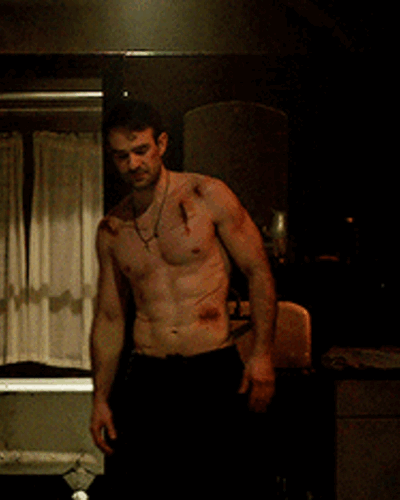
Pairing: Matt Murdock/Reader
Word Count: 2139
Warnings: Matt cosplays Jesus because he’s catholic or something, blasphemy, NSFW, impact play (flogging, draws blood), blood, use of wartenberg wheel (not puncturing skin), PIV sex, female reader, no description of birth control, aftercare, bondage (specifically on a cross with cuffs), slight suspension, sub!matt, religious masochism, sadist!reader, minor consumption of alcohol by matt (not to the point of impairment), this is fucked up and dark thematically but nobody dies or is hurt
A/N: I’ve had this idea for so long and I’m so happy to finally write it down! There are going to be some minor inaccuracies compared to the actual crucifixion (e.g. Matt won’t die or be punctured, he drinks wine instead of posca, etc). I am aware of these deviations and they exist for ~stylistic~ reasons.
“Confiteor Deo omnipotenti, sum ut peccare, mea culpa, mea culpa, mea maxima culpa. Ideo precor beatam Mariam semper virginem, omnes Angelos et Sanctos, et vos, fratres, orare pro me ad Dominum Deum nostrum.”
(I confess to almighty God, that I am about to sin, through my fault, through my fault, through my most grievous fault; therefore I ask blessed Mary ever-Virgin,
all the Angels and Saints, and you, my brothers, to pray for me to the Lord our God.)
Matt clutched the deep red rosary, rolling the beads between his fingers as he recited the Latin. There was no prayer in the Catholic Church for sin about to happen, so he had to modify the Confiteor somewhat. Between him and God, he’d also shortened it. You might chide him if you knew, but thankfully you were unfamiliar enough not to notice. He was too nervous, too excited for what awaited to let the extra verses pass his lips. God would forgive him. Or He wouldn’t. In the face of what was about to happen, he couldn’t bring himself to care.
“Amen.” You said, noticing that Matt had fallen into silence as he knelt at the foot of the bed.
“Amen.” Matt echoed.
Behind him was the small velvet footrest. Atop it, a glass of wine filled less than an eighth of the way. A wendenberg wheel, small and with points around the edge, blunt enough that they wouldn’t draw blood. A flogger. Four nails.
You felt a shiver up your spine as you looked at the nails. Thank god they were just for the ambience, the scent of iron heavy in the air for Matt, the visual aid for you. You couldn’t imagine driving them through Matt’s palms. Even the thought made you want to take his hands in your own and kiss them. The safe word today, Judas, was as much for you as it was for him. You weren’t sure if you could stomach administering the suffering he had asked you to put him through.
“Are you ready?”
Matt nodded.
“Verbally, today. And the safe word.”
“Yes, I’m ready. And the safe word is Judas.”
“I’m going to try not to break scene because you asked me not to, but I’ll touch you gently to check in, okay? And remember that you can move your wrists towards each other to disengage the cuffs.”
“Yes,” Matt said, dragging out the ‘s’ slightly. He was already hard, you noticed as he turned around, walking to the wall where you’d installed the crossbar.
You stripped him unceremoniously, taking these moments to breathe and prepare yourself to bind him, flog him. The clothes fell in a heavy pile, smelling slightly of Matt’s sweat and cologne. He was left in nothing but his cross necklace. It was about to become almost ironic, the symbol reflected in miniature and life size.
“Kneel.”
His reaction seemed so immediate that it almost preceded your command. He knew the story all too well. Stripped, flogged, the wine, the crucifixion, the death, the burial, the resurrection. He could recount the order in his sleep, although he wasn’t entirely sure when he realized he wanted to go through it himself. Certainly after he met you. He couldn’t imagine feeling safe enough with anyone else.
“It will be eighteen strikes altogether. Six, six, and six.”
Matt was silent. You knew this was part of what he wanted. He was entering a meditative space, reflecting on the sacrifice, wanting to fully experience the pain, the Passion. The two of you had agreed on all of the components ahead of time. You took in the wide expanse of his back, muscles tensing and relaxing as he settled into the position, anticipating the impact.
You drew a deep breath, and saw Matt’s back round as he did the same, and brought the flogger down on his back. Again, again, again. There was a small sound of suction as Matt brought his bottom lip between his teeth. He exhaled as you brought the flogger down twice more. His skin reddened, raising in lines where the braided leather had made contact.
Wanting to avoid hitting the same area over and over again, you walked to his other side. Small mercies, you told yourself. You loved him and didn’t want him to hurt too badly. Although the strained sound of his withheld groans was having an effect on you...
Pressing the guilt to the back of your mind, you swung the flogger six times in quick succession, striking a higher part of his back, across and between his shoulderblades. The figure-8 pattern you made with your wrist meant less pressure on his skin, but a more continuous sting.
He let out a soft ‘ah’ sound, his lips falling apart for a moment as he rocked forward as your last blow landed.
“Make the last six hurt,” He whispered. “Break the skin.”
“Okay,” You whispered, lifting your arm up and back.
Letting considerably more of your strength carry the flogger down, the toy made a loud sound on impact. Matt arched away from it, but stayed silent. He nodded.
You hit him again, again, again. As you raised your hand, you noticed small beads of blood beading along thin abrasions on Matt’s back. Biting your lip, you moved your hand slightly further down again, ensuring you’d miss the area that was starting to bleed slightly. The last two strikes were swift, but no lighter.
Matt sighed loudly and stood, walking to the wall. He felt for the crossbar and raised his hands in line with it, waiting for you to fix the cuffs to his wrists. With his back to the wall, he had to arch slightly, wincing as his freshly-wounded back made contact with the surface.
While planning this out, you’d opted not to purchase a whole BDSM cross setup, thanks to the relatively small size of your shared apartment, and instead opted to mount a wide plank with two metal loops on either side, each of which could support a single unlined cuff. This had the added bonus that Matt could stand on the ground most of the time, but allow his arms to hold his weight temporarily if he weakened. Additionally, you had custom measured the plank to Matt’s wingspan, meaning it was perfectly designed to accommodate his outstretched arms. The afternoon you’d measured it had been fun, full of tension as your lips were inches from his while you took measurements.
You finished adjusting the cuffs around both his wrists, and double-checked that he could comfortably stand with his feet flat on the floor. Taking a step back to admire the man stretched out before you, you couldn’t help but smile at his body, at your mercy like this. It was a beautiful body too. Your eyes caught sight of the small cross that lay flat on his chest, hanging perfectly below his collarbones.
“I thirst.” He breathed.
You reached down for the glass of red wine, and walked silently back to Matt’s side. With his senses being what they were, he could smell the glass, even hear its resonance as the air moved against it, given the silence of the room.
“Take of your blood.”
His lips parted and his head tipped back as much as his position against the wall could allow. You lifted the glass and slowly tipped it towards his mouth, allowing the mouthful of wine to pass his lips, drop by crimson drop. He swallowed, and something about the movement of his Adam’s apple was so sensual that you couldn’t help but stare.
You set the glass off to the side and stroked Matt’s cheek with the back of your hand. He heard the soft metallic sounds of the pointed wheel. He licked the last of the wine off his lips and closed his eyes.
Testing a light pressure on the back of your hand first, you rolled the points over your skin. You pressed a little harder, sparking slight pain. That would be the pressure you would use for Matt.
You started over his palms, using one hand to splay his hand open, and the other to roll the wheel down the length of his palm. Repeating the action over his other palm, and then kneeling to roll it over the tops of his feet and ankles, you felt there was something deeply meditative about it. Calm swept over you. It was all symmetrical, Matt’s body reacted in predictable ways, tensing and easing.
Rising, you rolled the wheel up the length of his leg. His cock twitched. You breathed and picked up the wine glass before you rose to your full height. That marked the end of your work with the tools. You set them aside on the velvet footrest and sat on the end of the bed. Matt had requested a song, Miserere mei, Deus, a choral arrangement of one of the psalms. It was hauntingly beautiful as it echoed through the room. You would let the song loop two more times before untying him. At each high note, you watched goosebumps rise on his skin. He drew deep breaths, his eyes still closed.
The minutes passed fairly quickly for you, as you let your gaze drift around the room, monitoring Matt’s reactions, stretching your neck from side to side. You knew that for Matt, they would last much longer, the lingering pain on his back as the blood dried, the stress of holding his arms aloft, the heaviness of letting his body echo that of Christ, the darkness. Along with that, all of the senses: the pain, the smell of iron and wine, the taste of tannins, the sound of his heart slowing as he meditated. The feeling of sacrifice, overwhelm, sadness, having been forsaken by the Father...
Matt drew a sudden loud breath, tugging at the restraints, breath becoming faster. Glancing at your phone screen quickly. you saw that the final loop was mere seconds from ending. You rushed to your feet.
“I’m going to let you down,” You whispered. “You’ve finished, Matt.”
“I’m okay,” He breathed, breath steadying. “But yes, let me down.”
The final part, you thought. Death. You’d borrowed from the French here. His death would be a small one, la petite mort. He’d asked to fuck you afterwards. Nothing brought him closer to God than this.
You pulled at the buckles, letting his arms down one at a time, supporting their weight with your own hands, helping return them to his side, so they wouldn’t drop suddenly, leaden from use. He waited for a few moments while you undressed and lay on the bed, ready.
“Do you want this?” He asked, stepping towards the bed.
“Yes.”
Then he was over you like a sudden dark cloud. His hair, wet with sweat, hung in your face as he moved, lining himself up with your entrance. You were ready enough from all of the foreplay, all of the waiting, taking in his naked, perfect form.
He’d warned you in advance that he wouldn’t last, that he wouldn’t be mentally present enough to help you come. He chased his own pleasure, allowing himself to be selfish for once, letting the pain and pleasure melt together as the wounds on his back opened, letting occasional drops of blood fall atop the sheets. He whined and groaned and writhed, pressing his hips deep into yours. He was single-minded.
As he’d said, he didn’t last long, and it was only a few minutes before he pulled out, painting your chest with his come. His breathing was ragged, and you could tell by everything about the way he breathed, moved, that he was exhausted.
“Matt, lie down on your front, I’ll be back in a moment,” You said softly, stroking his hair.
He hummed and moved to lie down, groaning at the movement.
You returned, clean, with warm cloths and cream for his back, and tended to it gently. Leaving one of the larger, clean cloths over his back, you insulated it with a blanket to keep the area warm. You reached for an unscented body lotion and spread it gently over his arms and shoulders, gently massaging the muscles until Matt asked you to stop.
“What do you need?” You whispered, stroking your fingertips over the back of his neck.
“M’gonna go to sleep,” He mumbled. “I just need you close.”
You rolled him over slightly, just enough to slide your body between his chest and the mattress. He rested his head on your breast, letting his hand come to your hip, and fell asleep. You fluffed the pillows around your head and made sure Matt’s back was covered with one of the cloths and a blanket.
Satisfied, and somewhat exhausted yourself, you drifted off to sleep, and dreamt of walking through fields of clouds.
#Matt Murdock#matt murdock x reader#matt murdock smut#matt murdock/reader#Daredevil#fanfic#fanfiction#reader insert
13 notes
·
View notes
Text
I have to take a moment to write about this because I watched episode 4 of this season of Gentleman Jack yesterday and though I was glad to see them in church again, they did the thing that always ticks me off, i.e. using Christianity to make a character feel guilty.
Out comes the 1662 Book of Common Prayer, from which Sally Wainwright lifted the words in the scene: “Ye that do truly and earnestly repent you of your sins, and are in love and charity with your neighbors, and intend to lead a new life, following the commandments of God, and walking henceforth in these holy ways, meekly kneeling on your knees...”
We hear a priest saying that just as Anne is going up to receive Holy Communion. In actuality, these words precede the general confession, so you’re getting an instruction to confess without also getting the absolution (which I will get to in a moment). And the big thing is, what was left out of that paragraph from the original text are the words, “Draw near with faith, and take this holy Sacrament to your comfort; and make this humble confession to Almighty God, meekly kneeling on your knees.”
The words emphasized are important, because we’re watching characters “take the sacrament” without anyone telling us what the sacrament is. I’m not going to attempt to explain what the sacrament is here, but these are some of the words immediately preceding what’s used in the episode, from the 1662 BCP:
“And to the end that we should always remember the exceeding great love of our Master and only Saviour Jesus Christ, thus dying for us, and the innumerable benefits which by his precious blood-shedding he that obtained to us; he that instituted and ordained holy mysteries, as pledges of his love, and for a continual remembrance of his death, to our great and endless comfort.”
Now anyone could say, “I have no idea what any of that means, what difference does it make?” But the point is, that is Christianity. That is the religion they are using as a plot device in a TV series. And they have more or less edited out the Christianity -- the message of hope and love and comfort which makes the faith what it is.
Like yes, confession and repentance are important before taking the sacrament. There are all kinds of warnings about damnation. But there are also the words, “therefore if there be any of you, who by this means cannot quiet his own conscience herein, but require further comfort or counsel, let him come to me, or to some other discreet and learned Minister of God’s Word, and open his grief; that by the ministry of God’s holy Word he may receive the benefit of absolution, together with ghostly counsel and advice, to the quieting of his conscience, and avoiding of all scruple and doubtfulness.”
Your guilt is meant to be eased. Not to mention the general absolution that comes after the paragraph used in the episode, which always ends, “Have mercy upon you; pardon and deliver you from all your sins; confirm and strengthen you in all goodness; and bring you to everlasting life.”
It’s all good. But a story can’t emphasize divine forgiveness, because then you can’t make guilt/forgiveness between characters a point of conflict in the story. Hence the Church always gets pulled out as a guilt-emphasizing device to heighten drama, and it becomes a stereotype that going to church will make you feel bad when (when it’s done right, I will admit) it’s actually supposed to give you comfort and make you feel better.
I mean it’s right there in the words from 1662.
#like you are always assured forgiveness if you confess/repent#but that is hardly ever#ever#ever depicted in modern media#at least she lifted the words right out of the book#but kind of left out a LOT#Christianity#Gentleman Jack#be curious where it all goes#god stuff
12 notes
·
View notes
Text

The First Sunday after Christmas
December 31, 2023
Pastor Tom Steers,
Christ the Saviour Lutheran Church, Toronto
OPENING HYMNN: 386 “Now Sing We, Now Rejoice”
(Lutheran Service Book)
youtube
The Invocation Page 184
Confession and Absolution Page 184-185
Introit
Psalm 98, verses 1-4; Isaiah 52:10
10 The Lord has bared his holy arm before the eyes of all the nations,
and all the ends of the earth shall see the salvation of our God.
Oh sing to the Lord a new song, for he has done marvelous things!
His right hand and his holy arm have worked salvation for him.
2 The Lord has made known his salvation;
he has revealed his righteousness in the sight of the nations.
3 He has remembered his steadfast love and faithfulness
to the house of Israel.
All the ends of the earth have seen the salvation of our God.
4 Make a joyful noise to the Lord, all the earth;
break forth into joyous song and sing praises!
Glory be to the Father and to the Son
and to the Holy Spirit;
as it was in the beginning,
is now, and will be forever. Amen.
10 The Lord has bared his holy arm before the eyes of all the nations,
and all the ends of the earth shall see the salvation of our God.
Collect Prayer:
O God, our Maker and Redeemer, You wonderfully created us and in the incarnation of Your Son yet more wondrously restored our human nature. Grant that we may ever be alive in Him who made Himself to be like us; through Jesus Christ, our Lord, who lives and reigns with You and the Holy Spirit, one God, now and forever. Amen.
Our Bible Readings:
Old Testament Reading -- Isaiah 61:10—62:3
Psalm 111 Our Epistle Reading -- Galatians 4: 4-7 Our Gospel Reading -- Luke 2: 22-40
THE APOSTLES’ CREED Page 192
HYMN OF THE DAY: 938 “In Peace and Joy I Now Depart”
youtube
THE SERMON
‘Human Sight or Spiritual Sight’ –
In our times we’re faced with worries and concerns.
War, crime, and disease surround us.
The world can appear as an endless series of obstacles to overcome to be happy, if not just survive.
We may see life through human eyes, in human terms.
In our Gospel passage today we read of Simeon, a man led by the Holy Spirit.
A man of intense faith.
His very name means, “one who hears.”
Simeon listens and believes God’s promise that he would see the Saviour, the promised one, before he died.
We can imagine this might have led Simeon to live a life of worry and anxiety -- but it didn’t.
Like all the prophets before him, Simeon lived by faith in God’s Word.
Once he sees the infant Christ, he’s content to be taken into God’s arms, after he takes the Lord Jesus into his arms.
Simeon is then happy to be with the Almighty in peace and joy.
He’s not afraid of death, he’s seen his Saviour who will deliver him from sin and eternal separation from God.
It’s the same for us.
The Holy Spirit works faith in us using God’s means of grace -- His Word found in the Bible, and the Sacraments of Baptism and the Lord’s Supper.
These means of grace are found within Christ’s Church.
The temple in First Century Jerusalem was a busy place.
A site of almost constant activity.
Into this scene come Mary, Joseph, and the infant Jesus.
If any parents had reason to worry, it would have been this couple.
Mary, a peasant teenager, had been told she would bear the son of the Most High.
She wouldn’t give birth in her hometown with the comfort of family around her.
She delivered her child in a stable in another village.
Joseph, who considered divorcing Mary when he found out she was expecting, was told by an angel that his wife would bear the Messiah.
Not long after these events, Mary and Joseph were told by an angel to run for their lives to Egypt so the ruling Jewish king wouldn’t kill the child.
They had every reason to worry.
But they walked by faith, not human sight.
Many parents would have brought their first-born baby boys into the Jerusalem temple on the day Mary and Joseph presented Jesus to the Lord.
To others the Holy family would seem to be just another poor couple fulfilling the Law of Moses.
How then were Simeon and Anna able to pick Jesus out of the crowd?
How did they identify Jesus as the promised Messiah?
And how was it that the rest of the crowd saw nothing special?
The Apostle Luke gives us the answer.
He connects Simeon to the Holy Spirit three times in the Gospel reading:
1) Luke writes the Holy Spirit was upon him,
2) It had been revealed to Simeon by the Spirit that he would see Christ, and
3) Simeon came in the Spirit into the temple.
Martin Luther reminded us in his explanation to the Third Article of the Apostle’s Creed that the Holy Spirit: calls, gathers, enlightens, and sanctifies.
Spiritual sight given by God led Simeon to the temple at just the right moment for him to see Jesus.
We can think of Simeon waiting in the temple, watching parents bringing their first-born sons for years.
Then, when Mary and Joseph entered with Jesus, the Spirit tells Simeon -- "This is the one!"
It would not have been the wealth or stature of the humble little family that made them stand out.
Those who waited for an ‘earthly’ king would have missed Jesus.
Even today some may downplay the event.
They might say, “it was nice that God made this special provision for Simeon, the story about Anna is also touching, but what have they got to do with me?"
It’s this: just as the Holy Spirit led Simeon and Anna to Jesus in the temple, He also leads us to Jesus today.
The Holy Spirit is the only way anyone sees Christ as Saviour.
In today’s world there are many who believe in the historical Jesus.
They’ll concede Christ lived on earth.
They’re ready to admit Jesus did good deeds, taught noble teachings, and is a fine example for anyone to follow.
They’re ready to praise His bravery in criticizing the corrupt temple bureaucracy and social establishment of His day.
In fact, anyone who’s honest must agree Jesus changed history in an enormous way, and that His great influence continues.
Many in the world see the historical Jesus, but they don't see the Son of God come to earth.
They see the historical Jesus, but they don't see their Redeemer.
Only the Spirit gives us the ability to see Jesus as our Saviour.
And with the Holy Spirit's gift of faith, we see the crucifixion as the truest expression of God's love for each and every one of us today.
It’s the Holy Spirit who opens spiritual eyes so we become aware of sin in our lives, and our need for a Saviour.
He shows us that we haven’t loved God with our whole heart, that we haven’t loved our neighbours as ourselves.
By the power of the Spirit, we see the reality of the terrible, eternal punishment our sins deserve.
But our loving and merciful God doesn’t leave us in that predicament.
It’s Christ Himself that explains this to us.
Jesus told Nicodemus one night when that leader of the Pharisees came to Him: “Truly I say to you, unless one is born again, he cannot see the Kingdom of God.”
Nicodemus didn’t immediately understand.
So, Christ explained that without the Holy Spirit we can neither see the Kingdom of God, nor enter it.
How many people today in our world won’t see the Kingdom or enter because they only see with human sight.
And so, as Christians, the question becomes: do we care?
Has our spiritual sight changed our lives as it did with Simeon and Anna?
A blind person can’t react by sight to the world around them.
Without help they stumble and fall.
If we saw a blind person on the street about to cross a busy intersection, who among us wouldn’t reach out their hand, wouldn’t speak up, and offer help.
Is it then no less important, no less compelling, when we see the spiritually blind around us, the lost who may be lost for all eternity, that we should speak up and offer help – offer witness – to our Saviour?
Should we not respond to God’s great gift of love, the gift of salvation through Christ, with the same compassion for others -- even strangers?
As believers assured of salvation through Christ, we react to the world around us differently than the faithless, the unsaved, just as a sighted person reacts differently than the blind.
We begin to see the world as God wants us to.
Our human priorities are realigned with God’s desire for our lives, and those around us.
And what others around us need, more than anything, for this life and for eternity, is to know their Lord & Saviour, and the salvation that comes only through Him.
Our ultimate purpose in life is to know Christ and to make Him known, in whatever way, through whatever means and gifts God gives us.
The Great Commission our Lord gave the disciples, He gives to all Christians -- His disciples of today.
Because there is a world of blind people outside the Church who are in spiritual darkness . . .
. . . who we can reach out to and help as they stumble,
. . . who we can be a light to reflecting the true light of Jesus,
. . . who we can witness to and speak of the eternal life and salvation found only in our Lord.
It can be as simple as telling them about the hope we have in Christ, what it means, and has meant to us.
It can be as simple as inviting them to hear the Word of God and attend our Sunday Church service.
May the Lord of all comfort and grace grant us the spiritual eyes to see Him.
Through the power of the Holy Spirit, may we respond to the need of others to know Christ -- the Saviour of the world.
Amen.
THE PRAYERS OF THE CHURCH
SERVICE OF THE SACRAMENT Page 194 THE LORD’S PRAYER Page 196
THE WORDS OF OUR LORD Page 197
��
THE DISTRIBUTION
POST COMMUNION COLLECT (Right-hand column) Page 201
BENEDICTION Page 202
CLOSING HYMN 359 “Lo, How a Rose Ever Blooming”
youtube
#lutheran#christian religion#faith#jesus#bible#christian#salvation#evangelism#holy spirit#religious art#Youtube
0 notes
Text
Today's Daily Encounter Tuesday, October 17, 2023
My God is Great
"Haven't I commanded you: be strong and courageous? Do not be afraid or discouraged, for the Lord your God is with you wherever you go."1
My daughter's favorite Disney movie is The Lion King, but she absolutely hates the scene in the gorge when — spoiler alert — Simba's father dies. This scene in its entirety is quite overwhelming. It begins with a lie; the evil uncle tells the young cub that his father is waiting for him, but it's a trap. Simba is approached by a group of hyenas looking to make him their lunch. The small lion, in an attempt to defend himself, roars at them. However, his undeveloped, not to mention cute, little roar only makes the hyenas laugh. Simba tries his roar again only to bring more laughter and jest from his would-be predators. Then, gathering all his courage, he lets out his best roar. The sound that emerges is great and mighty! The enemies turn and run, not because of the roar, but because his daddy, the great lion king, had come up behind his son and Simba was safe in the shadow of his almighty father.
In the Old Testament, after the death of Moses, Joshua became the Israelites' new leader and was tasked with the job of leading them to a new land. He had walked beside Moses and knew that these were not easy people to lead and feared the struggles that he was sure to encounter along the way. But in the first chapter of Joshua, we see the Lord lovingly preparing Joshua to take on this great task. In verse 5, the Lord assures him saying, "No one will be able to stand against you as long as you live. I will be with you, just as I was with Moses. I will not leave you or abandon you." He urges Joshua to be strong and courageous yet at the same time promising to never leave his side! I'm not sure about you, but I think I would feel extra-empowered knowing that I had the Almighty by my side! However, God also warns Joshua in verse 8 saying that he must not neglect God's Words for only then would he prosper and succeed.
Our enemies have no power against us when we stand in the shadow of our Great God. He will fight every battle for us as long as we stay close to Him. He already fought, and won, the greatest battle of all; the battle that gave you eternal Salvation through Jesus Christ. Even death could not defeat Him. The devil will feed us every lie, and set every trap to lure us into sin, but as long as we remain in God's Word, He will give us the strength and courage to let out our best roar, knowing that our Father God is right beside us!
Suggested Prayer: Dear Heavenly Father, thank you for your promises. Without You I am small and weak, but in You I am strong. Today, I seek to be near you and I claim the promise that You are with me wherever I go. In Jesus' name, Amen.
Joshua 1:9 (CSB).
Today's Encounter was written by: Veronica B.
NOTE: If you would like to accept God's forgiveness
for all your sins and His invitation for a full pardon
Click on: http://www.actsweb.org/invitation.php. Or
if you would like to re-commit your life to Jesus Christ,
please click on http://www.actsweb.org/decision.php to note this.
Daily Encounter is published at no charge by
ACTS International, a non-profit organization,
and made possible through the donations of
interested friends. Donations can be sent at:
http://www.actscom.com
ACTS International
P.O. Box 73545
San Clemente, California 92673-0119
U.S.A.
Phone: 949-940-9050
http://www.actsweb.org
Copyright (c) 2016 by ACTS International.
When copying or forwarding include the following:
"Daily Encounter by Richard (Dick) Innes (c) 2005-2023
ACTS International
0 notes
Text
TODAY, I MAKE 11½ YEARS SOBER (11½ YEARS WITHOUT DRINKING ALCOHOL AND SMOKING MARIJUANA);

The testimony I share is that if God gives you something, it's irrevocable- it cannot be taken away from you… God gave me a sobriety that nothing has been able to take away from me… Let me show you how…
Last year in March, after a party was made for me to celebrate 10 years sober, the great tests began. I won't go much into the details but the heartache was extremely intense.
I won't go much into the details of what happened but let me show you how intense that pain was. I would cry almost everyday, no one I talked to could comfort me, most times I had a death wish, I wondered why me… I deeply longed to understand why things happened the way they did.
I felt deeply betrayed and abandoned, I was downcast, very depressed and desperate… Very few people with a history of addiction would have stayed sober after going through what I went through.
I went through so much pain and I was wallowing in a very deep pit BUT I DID NOT DRINK OR LOSE MY SOBRIETY.
Whatever happened and how it happened targeted one thing- my sobriety… Satan wanted me to slip and go back to my old drinking ways. He wasn't happy that I made 10 years sober and he wasn't happy that my sobriety had started gaining ground in recognition. That's the storm he raised, the arrows he shot and the hits he pounded me with. God is always behind the scenes, most times not seen but He is always there.
In a fighting dream, you only see the enemy- might be a person or an animal and you take it as that. But if God was to remove the veil and fully reveal to you what is behind the scenes in that dream, you would see great lights (angels) surrounding you and fighting the darkness around you. God was with me behind the scenes in so much power and intensity that I did not slip back into my old ways of drinking, smoking cigarettes and blunts. Satan's hits were obvious and seen but what was unseen and realer than satan's hits is God's love (fiery protection against relapse) upon my life. When it comes to addiction to substances, God put me in and let me dwell in His secret place.
HE WHO dwells in the secret place of the Most High shall remain stable and fixed (in regards to my sobriety- consistent, unmoved, unshaken) under the shadow of the Almighty .
Psalm 91:1 AMPC
What God gives, nothing can take away…
For God's gifts and His call are irrevocable.
Romans 11:29 AMPC.
God set me free from addiction to alcohol and marijuana. Nothing has been able to take it away be it pain, trauma, great disappointment, intense betrayal, heartache, loss, persistent sickness and so much more.
My testimony is that I am still sober and I thank my Father for irrevocably giving me the gift of sobriety. Nothing has been able to separate me from His love (fiery protection against relapse).
For I am persuaded beyond doubt (am sure) that neither death nor life, nor angels nor principalities, nor things impending and threatening nor things to come, nor powers, Nor height nor depth, nor anything else in all creation will be able to separate us from the love of God which is in Christ Jesus our Lord.
Romans 8:38-39 AMPC
Someone once said that "Within every loss, every heartache, every pain, regret, setback etc; there's a seed of equal or greater benefit. I'm starting to see the greater benefit of whatever happened.
Today, birthed from my sobriety, there's a fully incorporated Foundation; Kinspired Sobriety Foundation https but that's on the outside and many things are happening on the outside.
The greater benefit of whatever I went thru is on the inside… God is setting my stones in antimony (revealing to me my worth, restoring my self-esteem, showing me how valuable and precious I am) and laying my foundations in sapphires (healing and immense growth from a traumatic past etc).
O you afflicted , storm-tossed and not comforted, behold, I will set your stones in fair colors and lay your foundations with sapphires.
Isaiah 54:11 AMPC
And I will make your windows and pinnacles of agates or rubies, and your gates of carbuncles, and all your walls of precious stones.
Isaiah 54:12 AMPC
God is sharpening my perspective that my eyes (making my windows and pinnacles of sparkling agates or rubies) started to see clearly… Much is happening within.
May the Name of Jesus be praised.
Read the full article
0 notes
Text
Earthquakes in Various Places: August 17th, 18th, and 19th: Celestial Events, Fireballs, Solar Flare, Second Chances, Thomas, Jesus Christ, Human DNA, Living Water, Pale Rider, Root of Jesse, Redemption, Liberation, Freedom, Truth, Peace, Almighty Abrahamic G-d and the Wisdom of the Ages. Part 6/7.
TANAKH (Jewish Publication Society, Hebrew-English): Page 145:
Exodus 15:1
Then Moses and the Israelites sang this song to the Lord. They said: I will sing to the Lord, for He has triumphed gloriously; Horse and driver He has hurled into the sea.
Exodus 15:2
The Lord is my strength and might; He is become my deliverance. This is my God and I will enshrine Him; The God of my father, and I will exalt Him.
Exodus 15:3
The Lord, the Warrior--Lord is His name!
Exodus 15:4
Pharaoh's chariots and his army He has cast into the sea; And the pick of his officers Are drowned in the Sea of Reeds.
Exodus 15:5
The depths covered them; They went down into the depths like a stone.
Exodus 15:6
Your right hand, O Lord, glorious in power, Your right hand, O Lord, shatters the Foe!
15:03:55…
Strong's Concordance #55
abak: to coil upward -- mount up, to turn, your Father.
Original Word: אָבַךְ
Earthquake: M 2.4 - 32.7 km (20.3 mi) NW of Stanley, Idaho
2023-08-18 15:03:55 (UTC) 44.441°N 115.206°W 8.4 km depth
Between Huffman Creek and Dodge Creek near New Creek and Walker Creek overlooking Salmon River adjacent to Cape Horn Mountain and Blue Bunch Mountain.
"Imagine the unspeakable beauty of the universe he sees! No wonder he doesn't talk." - Arthur Teller on Jacob/Israel Bohm (Touch)
The 2017 solar eclipse attracted a large number of visitors to Stanley and surrounding areas. The Milky Way is clearly visible in Stanley, and the town has sought the seal of approval from the International Dark-Sky Association.
Stanley is located in the Central Idaho Dark Sky Reserve which is the USA's first International Gold-Tier Dark Sky Preserve.
Huffman Name Meaning: Altered form of German and Jewish (Ashkenazic) Hoffmann. (Ancestry.com)
Hoffman is a surname of German origin. The original meaning in medieval times was "steward", i.e. one who manages the property of another. (Wikipedia)
dodge:
1: an act of evading or avoiding by sudden bodily movement
2: an artful device to evade, deceive, or trick
Phrase:
dodge a bullet or less commonly dodge the bullet: to narrowly avoid an unwelcome, harmful, or disastrous outcome or occurrence
(Merriam-Webster)
The 1985 Clint Eastwood film Pale Rider was mainly shot in the Sawtooth National Recreation Area near Stanley, Idaho, with the opening credits scene featuring the jagged Sawtooth Mountains south of Stanley.
Pale Rider is a 1985 American Western film produced and directed by Clint Eastwood, who also stars in the lead role.
The title is a reference to the Four Horsemen of the Apocalypse, as the pale horse's ghost rider (Eastwood) represents Death and is presumed to be dead. (Wikipedia)
This is all from Wikipedia as well to highlight that Jesus Christ wasn't being antisemitic or a traitor, he was being a freedom fighter for all native Israelis against actual Roman-loyalist traitors:
In Jerusalem, Herod introduced foreign forms of entertainment, and erected a golden eagle at the entrance of the Temple, which suggested a greater interest in the welfare of Rome than of Jews. Herod's taxes garnered a bad reputation: his constant concern for his reputation led him to make frequent, expensive gifts, increasingly emptying the kingdom's coffers, and such lavish spending upset his Jewish subjects.
The two major Jewish sects of the day, the Pharisees and the Sadducees, both showed opposition to Herod. The Pharisees were discontented because Herod disregarded many of their demands with respect to the Temple's construction.
The Sadducees, who were closely associated with priestly responsibilities in the Temple, opposed Herod because he replaced their high priests with outsiders from Babylonia and Alexandria, in an effort to gain support from the Jewish Diaspora.
Herod's outreach efforts gained him little, and at the end of his reign anger and dissatisfaction were common amongst Jews.
Heavy outbreaks of violence and riots followed Herod's death in many cities, including Jerusalem, as pent-up resentments boiled over. The scope of the disturbances sparked hopes that the Jews of Judea might some day overthrow the Roman overlords, hopes reawakened decades later in the outbreak of the First Jewish-Roman War in 66 CE.
Stanley: one who comes from a stone-filled/stony clearing/meadow. (Wikipedia)
Matthew 21:37
Last of all, he sent his son to them. ‘They will respect my son,’ he said.
Matthew 21:38
“But when the tenants saw the son, they said to each other, ‘This is the heir. Come, let’s kill him and take his inheritance.’
Matthew 21:39
So they took him and threw him out of the vineyard and killed him.
Matthew 21:40
“Therefore, when the owner of the vineyard comes, what will he do to those tenants?”
Matthew 21:41
“He will bring those wretches to a wretched end,” they replied, “and he will rent the vineyard to other tenants, who will give him his share of the crop at harvest time.”
Matthew 21:42
Jesus said to them, “Have you never read in the Scriptures: “’The stone the builders rejected has become the cornerstone; the Lord has done this, and it is marvelous in our eyes’?
Matthew 21:43
“Therefore I tell you that the Kingdom of God will be taken away from you and given to a people who will produce its fruit.
Matthew 21:44
Anyone who falls on this stone will be broken to pieces; anyone on whom it falls will be crushed.”
The antisemitic, genocidal, ethnic cleansing, and antichrist Sunday "Lord's Day" is a parents, plus 4 generation curse upon all who bend their knees to it.
That means that every self-proclaimed "Christian" (follower of the indigenous Israeli Jewish prophet and Christian Messiah known as Jesus Christ) is cursing themselves, their partner or spouse, their children, their children's children, their children's grandchildren, and their children's great-grandchildren every single Sunday of their entire antisemitic antichrist lives that they proclaim themselves the "True Lord of the Sabbath" by intentionally disobeying and ignoring
the commandments of the Almighty Abrahamic God.
However, just as Jonah learned at Nineveh, the curse on all generations is lifted at the moment of true repentance and course correction.
The Lord's Day in Christianity is generally Sunday, the principal day of communal worship. It is observed by most Christians as the weekly memorial of the resurrection of Jesus Christ, who is said in the canonical Gospels to have been witnessed alive from the dead early on the first day of the week. According to some sources, Christians held the Sabbath as resting day, commemorating the God's Commandment, which said that the Sabbath should be the day of resting, according to Exodus. 20:08. (Wikipedia)
Roman historian Tacitus referred to "Christus" and his execution by Pontius Pilate in his Annals (written c. AD 116), book 15, chapter 44.
Nero fastened the guilt and inflicted the most exquisite tortures on a class hated for their abominations, called Christians by the populace.
Christus, from whom the name had its origin, suffered the extreme penalty during the reign of Tiberius at the hands of one of our procurators, Pontius Pilatus, and a most mischievous superstition, thus checked for the moment, again broke out not only in Judaea, the first source of the evil, but even in Rome, where all things hideous and shameful from every part of the world find their centre and become popular.
Accordingly, an arrest was first made of all who pleaded guilty; then, upon their information, an immense multitude was convicted, not so much of the crime of firing the city, as of hatred against mankind. Mockery of every sort was added to their deaths. Covered with the skins of beasts, they were torn by dogs and perished, or were nailed to crosses, or were doomed to the flames and burnt, to serve as a nightly illumination, when daylight had expired. Nero offered his gardens for the spectacle, and was exhibiting a show in the circus, while he mingled with the people in the dress of a charioteer or stood aloft on a car.
Hence, even for criminals who deserved extreme and exemplary punishment, there arose a feeling of compassion; for it was not, as it seemed, for the public good, but to glut one man's cruelty, that they were being destroyed. (Wikipedia)
After Constantine the Great's in 321 and the Council of Laodicea from 363, the Christian rulers decided that the commandment of God is no more valid, now being needed to follow the commandments of people, switching in this sense the day of rest to Sunday, and by 361 AD it had become a mandated weekly occurrence.
“Our regard for the Lord’s resurrection, which took place on the Lord’s Day, will lead us to celebrate it on the same principle ”
“And all things whatsoever that it was the duty to do on the Sabbath, these we have transferred to the Lord’s Day as more honorable than the Jewish Sabbath.”
“Christians ought not to Judaize and to rest in the Sabbath, but to work in that day; but preferring the Lord’s Day, should rest, if possible, as Christians.
Wherefore if they shall be found to Judaize, let them be accursed from Christ.” (Wikipedia)
In Christian eschatology, the Antichrist refers to people prophesied by the Bible to oppose Jesus Christ and substitute themselves in Christ's place before the Second Coming. (Wikipedia)
The term Antichrist (including one plural form) is found four times in the New Testament, solely in the First and Second Epistle of John. The Antichrist is announced as the one "who denies the Father and the Son."
The similar term pseudokhristos or "false Christ" is also found in the Gospels. In Matthew (chapter 24) and Mark (chapter 13), Jesus alerts his disciples not to be deceived by the false prophets, who will claim themselves to be the Christ, performing "great signs and wonders".
Three other images often associated with the Antichrist are the "little horn" in Daniel's final vision, the "man of sin" in Paul the Apostle's Second Epistle to the Thessalonians, and the Beast of the Sea in the Book of Revelation. (Wikipedia)
TANAKH (Jewish Publication Society, Hebrew-English): Pages 1005 and 1006:
Jeremiah 2:1
The word of the Lord came to me, saying,
Jeremiah 2:2
Go proclaim to Jerusalem: Thus said the Lord; I accounted to your favor The devotion of your youth, Your love as a bride--How you followed Me in the wilderness, In a land not sown.
Jeremiah 2:3
Israel was holy to the Lord, The first fruits of His harvest. All who ate of it were held guilty; Disaster befell them--declares the Lord.
Jeremiah 2:4
Hear the word of the Lord, O House of Jacob, Every clan of the House of Israel!
Jeremiah 2:5
Thus said the Lord: What wrong did your fathers find in Me That they abandoned Me And went after delusion and were deluded?
Jeremiah 2:6
They never asked themselves, "Where is the Lord, Who brought us up from the land of Egypt, Who led us through the wilderness, A land of deserts and pits, A land of drought and darkness, A land no man had traversed, Where no human being had dwelt?"
Jeremiah 2:7
I brought you to this country of farm land To enjoy its fruit and its bounty; But you came and defiled My land, You made My possession abhorrent.
Jeremiah 2:8
The priests never asked themselves, "Where is the Lord?" The guardians of the Teaching ignored Me; The rulers rebelled against Me, And the prophets prophesied by Baal And followed what can do no good.
Jeremiah 2:9
Oh, I will go on accusing you--declares the Lord--And I will accuse your children's children!
TANAKH (Jewish Publication Society, Hebrew-English): Pages 1447 and 1448:
Psalm 32:1
Of David. A maskil. Happy is he whose transgression is forgiven, whose sin is covered over.
Psalm 32:2
Happy the man whom the Lord does not hold guilty, and in whose spirit there is no deceit.
Psalm 32:3
As long as I said nothing, my limbs wasted away from my anguished roaring all day long.
Psalm 32:4
For night and day Your hand lay heavy on me; my vigor waned as in the summer drought. Selah.
Psalm 32:5
Then I acknowledged my sin to You; I did not cover up my guilt; I resolved, "I will confess my transgressions to the Lord," and You forgave the guilt of my sin. Selah.
Psalm 32:6
Therefore let every faithful man pray to You upon discovering [his sin], that the rushing mighty waters not overtake him.
Psalm 32:7
You are my shelter; You preserve me from distress; You surround me with the joyous shouts of deliverance. Selah.
TANAKH (Jewish Publication Society, Hebrew-English): Page 1632:
Proverbs 20:3
It is honorable for a man to desist from strife, But every fool becomes embroiled.
TANAKH (Jewish Publication Society, Hebrew-English): Page 1611:
Proverbs 8:1
It is Wisdom calling, Understanding raising her voice.
Proverbs 8:2
She takes her stand at the topmost heights, By the wayside, at the crossroads,
Proverbs 8:3
Near the gates at the city entrance; At the entryways, she shouts,
Proverbs 8:4
"O men, I call to you; My cry is to all mankind.
Pursuing the Wisdom of the Ages demands and requires every lifelong student to tirelessly question, test, and prove that everything that's put forward as "truth" is, in fact, irrefutably true.
“I taught you everything you know, but I haven't taught you everything I know.”
#august#hope#holy bible#tanakh#christianity#judaism#christian faith#christian living#jesus christ#bible study#bible scripture#bible verse#earthquake#shabbat#sabbath day#faith#love#god#wisdom#truth
0 notes
Text
December 23, 2022
The Significance of the Insignificant: A Christmas Story
MEGHAN MELLINGER
Lee en
español
“But the angel said to them, ‘Do not be afraid. I bring you good news that will cause great joy for all the people.’” Luke 2:10 (NIV)
Imagine for a minute that you’re a shepherd in the Middle East long ago. Others would say you’re no one of any real significance, and you own very little. You don’t sleep in a bed; you sleep on the grass next to your sheep.
Being a shepherd isn’t a glamorous profession, but it’s a necessary one. Especially in this ancient context where sheep are essential for God’s people — not for warm sweaters and blankets but for sacrifices. For every one of your mistakes, mess-ups and hang-ups, sheep (or certain other animals like cows, turtledoves or pigeons) pay the price.
Sheep are born to die.
And as a shepherd, you always have job security because there is always a demand.
But imagine for a minute that one night you awake to a total stranger hovering above you, glowing.
“… Do not be afraid. I bring you good news that will cause great joy for all the people.” (Luke 2:10)
The angel tells you a baby has been born in the nearest village. But not just any baby — the Messiah, the promised Savior you’ve been waiting for.
But why you? Why didn’t the angel tell someone more notable, more worthy, more prestigious, first? Why a lowly shepherd like you?
You hurry to find a baby not born in a palace to the royal family, wrapped in the finest silks. No, you find a baby born to a young virgin mother and her carpenter fiance, wrapped in simple cloth in an animal trough.
You marvel at the scene before you. An unwed mother, who the law says should be stoned to death for conceiving a child outside of marriage. A humble carpenter, who believes his fiancee when she says she became pregnant via divine intervention, not traditional conception.
This isn’t the picture-perfect-Christmas-card image everyone expected of our long-awaited Savior. There’s no wealth or power or showy fanfare here at the birth of the promised almighty King — just farm animals and social outcasts.
Why would such a significant baby be born in such an insignificant way? Why would such significant news be told first to such insignificant people?
Look closely — the symbolism here is rich like chocolate cake: shepherds beholding the birth of a new Lamb. The Lamb of God. The all-powerful Savior, born to die for them. Not just for the elite, the rich, the other half. The Lamb of God came for the lowly, for the weak, for the shepherds sleeping next to the sheep.
The sheep on the hillside were born to die for some, but the Lamb of God was born to die as the final sacrifice for all.
The most powerful One came in the humblest way so that all are invited to know Him.
This isn’t just good news — it’s the best news we will ever receive.
The shepherds in Luke 2, like you and me today, may have imagined themselves as no one of any real significance. But because of one holy night, we now know the Significant One.
Jesus, I’m in awe of how You humbled Yourself for me, coming to earth to meet me in my insignificance. The simple details of Your birth paint a greater picture of Your radically inclusive love. Help me to spread this Good News! In Jesus’ Name, Amen.
0 notes
Text
This is a warning to all people over the earth. God is about to move because of men’s wicked rebellion in sin that is destroying the world. Repent and set your heart fully in God. Don’t misuse God’s grace to do willful or intentional sin. Jesus the Son of God did not die to so you can go back or stay in the sufferings of sin, rather he died so through his help of him working in you, you will be able to overcome sin and strive for a beneficial life with him leading the way. Why do you think all these terrible things are happening in today’s world? It is because men disobey the God’s Law and do their own thing which never ends well because there is no benefit to evil. You wicked Globalist instead of helping the people, you abuse the people.God sees all what you are doing.How can you expect a positive result when all you putting is a negative? It just doesn’t work that way. What you input you get the same output. Evil is deceptive and non- beneficial . You can have all the riches and pleasures of this world and still won’t be unsatisfied. That is because that hole in your heart can only be filled with God. So open your bible and seek God in earnest prayer. Trust in God’s Word the Bible and the Holy Spirit that words does not conflict because it it the same word.
2 Peter 1:21, For the prophecy came not in old time by the will of man: but holy men of God spake as they were moved by the Holy Ghost(KJV). Luke 1:37, For no word from God will ever fail.”(NIV) It doesn’t matter how far you gone or what you done wrong. God will forgive you and help you get on the right track only if you are willing. 1 John 1:9, If we confess our sins, he is faithful and just and will forgive us our sins and purify us from all unrighteousness. John 3:16-17, For God so loved the world, that he gave his only begotten Son, that whosoever believeth in him should not perish, but have everlasting life. For God sent not his Son into the world to condemn the world; but that the world through him might be saved.
(KJV) Romans 6:23, For the wages of sin is death; but the gift of God is eternal life through Jesus Christ our Lord.(KJV) Jesus is coming again but that day won’t come until the gospel has been preached to all nations and when the earth is in a desolate state. What other hope is out there but only in Jesus Christ? You see how evil this world has gotten rapidly and it not getting better but worse. Jesus is coming soon but he is not coming to dwell on the earth again he is coming to save those who made the choice and will to serve him in goodness and saved from the deception of this polluted world. And that day won’t come unless the earth is in a desolate state.The one who is coming on the scene of the earth is Satan and his demonic angels who will work with human agents to deceive the world with false miracles and wonders to make people think he is god when is not. Mark 13:22, For false
Christs and false prophets shall rise, and shall shew signs and wonders, to seduce, if it were possible, even the elect. 2 Thessalonians
2:9 ,Even him, whose coming is after the working of Satan with all power and signs and lying wonders,
Revelation 16:14, For they are the spirits of devils, working miracles, which go forth unto the kings of the earth and of the whole world, to gather them to the battle of that great day of God Almighty. Revelation 13:13-14, “And he doeth great wonders, so that he maketh fire come down from heaven on the earth in the sight of men,” “And deceiveth them that dwell on the earth by the means of those miracles which he had power to do in the sight of the beast; saying to them that dwell on the earth, that they should make an image to the beast, which had the wound by a sword, and did live.” Every human being who ever existed has to make a choice on who master they will serve and there is only two options. There is no middle ground. Matthew 6:24, No man can serve two masters: for either he will hate the one, and love the other; or else he will hold to the one, and despise the other. Ye cannot serve God and mammon.(KJV) Either you will serve the only true God the creator and accept God in your heart to do his good will and prosper and enjoy heaven and reside with him for all eternity where there will not be any sickness, death, sufferings, shortages, or any bad thing to rise again that sin has caused.Only God’s love and goodness in beings and things will be there in abundance never to worry about decay or expiration. Or you will serve the devil who brought sin into the world through deception and do the pleasure of evil and burn in hell with him till your sin and being will be consumed and will be put to eternal death, never to rise again. Why choose evil? There is nothing beneficial for you to reap, only self destruction is waiting for you. For evil does not prosper but only goodness does . Goodness always win in the end because God never lost a battle not now not ever to Satan and his evil followers and their plans. The dead will rise again .Those who choose to accept Jesus of the Bible in their hearts and life will rise again if they died to live forever in Jesus in the first resurrection in Jesus Second Coming. Those who died and reject Jesus of the Bible will rise again to be be condemned by birth and if guilty they will perish in the second resurrection , all because they rejected him in their hearts. So every human being that ever exist, whether they have died or whether they are still alive, all will be accounted for on that day when Jesus puts an end to sin on his third coming. So why do you choose evil and not listen to God’s Word the Bible so that you may live. Ezekiel 33:11, Say unto them, As I live, saith the Lord God, I have no pleasure in the death of the wicked; but that the wicked turn from his way and live: turn ye, turn ye from your evil ways; for why will ye die, O house of Israel? (KJV) Trust in God he will take care of you. It dosn’t matter what threats the
world may dish out, God always has the last word. If he allow you to go through the storm, he will be there to help you preserve through it as long as you willing. He will open
doors that men knows nothing about to supply you every need. You don’t need the world to survive you just need God. So have faith in him knowing he will take to the end of the world so you will be where he is , one day if you don’t give up on him. Even if you die you will rise again and be with God have access to the universe. Mark 8:36, For what shall it profit a man, if he shall gain the whole world, and lose his own soul?(KJV) Why settle for the world when you can have the universe with God if you choose to do his good will. So don’t fall for the evil deceptions of this world run by the devil. You can’t reap deception because it is not real.Instead trust in God’s word knowing that he is massively a lot stronger than the devil. There will a deceptions in the last days. Satan and his followers will seek to change the sabbath the seventh day to the first day sabbath. He will seek men away from the Bible. He and his demons will try to impersonate Christ and dead love ones. He will force people into worshiping him and take on his evil plans. He will oppress those who worship the true God. But if we look to God of the Bible, God never changed the sabbath. God did not alter the Bible and has been consistent haromony back then , now, and forever more. God is the only one who can resurrect dead people back to life. That when a person dies they don’t even know they were dead. They simply cease to exist after the last breath. God’s Word does not change because it is consistently true. Luke 21:33, Heaven and earth shall pass away: but my words shall not pass away. (KJV) James 1:17, Every good and perfect gift is from above, coming down from the Father of the heavenly lights, who does not change like shifting shadows. (NIV) God knows what is best for you, trust him and he will take care of you even when the tribulation happens. Revelation 7:9-17, After this I looked, and there before me was a great multitude that no one could count, from every nation, tribe, people and language, standing before the throne and before the Lamb. They were wearing white robes and were holding palm branches in their hands. And they cried out in a loud voice:
“Salvation belongs to our God,
who sits on the throne,
and to the Lamb.”
All the angels were standing around the throne and around the elders and the four living creatures. They fell down on their faces before the throne and worshiped God, saying:
“Amen!
Praise and glory
and wisdom and thanks and honor and power and strength
be to our God for ever and ever.
Amen!”
Then one of the elders asked me, “These in white robes—who are they, and where did they come from?”
I answered, “Sir, you know.”
And he said, “These are they who have come out of the great tribulation; they have washed their robes and made them white in the blood of the Lamb. Therefore,
“they are before the throne of God
and serve him day and night in his temple;
and he who sits on the throne
will shelter them with his presence.
‘Never again will they hunger; never again will they thirst.
The sun will not beat down on them,’[a] nor any scorching heat.
For the Lamb at the center of the throne will be their shepherd;
‘he will lead them to springs of living water.’[b]
‘And God will wipe away every tear from their eyes.’[c]”
The word is true and these events will unfold but don’t look too much at the problem but focus on the solution which is Jesus Christ my lord and hope he will be yours too. For they might be some who is above this earthly law but there is no created being that is above God’s Universal Law, not even the devil himself.
Philippians 2:10-11
that at the name of Jesus every knee should bow, of things in heaven, and things in earth, and things under the earth; and that every tongue should confess that Jesus Christ is Lord, to the glory of God the Father.
Please Share the world needs to know!!! Last Warning!
1 note
·
View note
Text
Today, the Church remembers St. Agnes, Martyr of Rome.
Ora pro nobis.
Agnes of Rome (c. AD 291 – c. 304) is a virgin martyr, venerated as a saint and martyr. She is one of seven women who, along with the Blessed Virgin, are commemorated by name in the Canon of the Mass.
Biography
The legend cannot be proven true, and many details of the fifth century Acts of Saint Agnes are open to criticism likely full of elaboration, though substantially the circumstances of her martyrdom are authentic. Archaeological evidence indicates that a young girl of about thirteen years of age, a virgin named Agnes, was martyred in Rome and honoured for her sacrifice. A church was built over her tomb, and her relics venerated.
The details of her story are unreliable, but according to tradition, Agnes was a member of the Roman nobility, born in AD 291 and raised in an early Christian family. She suffered martyrdom at the age of twelve or thirteen during the reign of the Roman Emperor Diocletian, on AD 21 January 304.
A beautiful young girl of wealthy family, Agnes had many suitors of high rank, and the young men, slighted by her resolute devotion to religious purity, submitted her name to the authorities as a follower of Christianity.
The Prefect Sempronius condemned Agnes to be dragged naked through the streets to a brothel. In one account, as she prayed, her hair grew and covered her body. It was also said that all of the men that attempted to rape her were immediately struck blind. The son of the prefect is struck dead, but revived after she prayed for him, causing her release. There is then a trial from which Sempronius recuses himself, and another figure presides, sentencing her to death. She was led out and bound to a stake, but the bundle of wood would not burn, or the flames parted away from her, whereupon the officer in charge of the troops drew his sword and beheaded her, or, in some other texts, stabbed her in the throat. It is also said that her blood poured to the stadium floor where other Christians soaked it up with cloths.
Agnes was buried beside the Via Nomentana in Rome. A few days after her death, her foster-sister, Emerentiana, was found praying by her tomb; she claimed to be the daughter of Agnes' wet nurse, and was stoned to death after refusing to leave the place and reprimanding the pagans for killing her foster sister. Emerentiana was also later canonised. The daughter of Constantine I, Saint Constance, was said to have been cured of leprosy after praying at Agnes' tomb. She and Emerentiana appear in the scenes from the life of Agnes on the 14th-century Royal Gold Cup in the British Museum.
An early account of Agnes' death, stressing her young age, steadfastness and virginity, but not the legendary features of the tradition, is given by Saint Ambrose.
Almighty and everlasting God, you choose those whom the world deems powerless to put the powerful to shame: Grant us so to cherish the memory of your youthful martyr Agnes, that we may share her pure and steadfast faith in you; through Jesus Christ our Lord, who lives and reigns with you and the Holy Spirit, one God, for ever and ever.
Amen.

#father troy beecham#christianity#troy beecham episcopal#jesus#father troy beecham episcopal#saints#god#salvation#peace#martyrs
6 notes
·
View notes
Text
Jesus Dies

by Robert Hawker
"Pilate marveled that He was already dead."
- Mark 15:44
Precious Jesus! Had the unjust judge but known your soul's travail and agonies, he would not have wondered at the speediness of your death. Instead his astonishment would have been that nature, so oppressed and so suffering, could have held out so long. That which would have crushed in a moment all creation, angels as well as men, Jesus endured on the cross in sustaining the wrath of God due to sin. In point of suffering, he wrought out a whole eternity due to sin on the cross; and in point of efficacy, he "forever perfected them that are sanctified." Jesus accomplished more in that memorable day than all the creatures of God could have done forever. Wonderful were the works which God dispatched in creation, but the wonders of redemption far exceed them.
The six hours which Jesus hung upon the cross wrought out a more stupendous display of almighty power and grace than the six days God was pleased to appoint to himself in making the world. But, indeed, Pilate need not have marveled at the quickness of Christ's death had this unjust judge but reflected on the previous sufferings of the Redeemer. They who have spent sweet hours in tracing Jesus' footsteps through the painful preludes to his death, and especially in the concluding scenes, have been able to note many a sorrowful part which bore hard upon his body also. If you were to trace back the solemn subject, you would find enough to excite your astonishment that Jesus lived so long on the cross rather than that he died not before.
His agony evidently began four days before the Passover. The evangelist Luke tells us that he spent the whole night in prayer and the whole day in preaching to the people in the temple. "My soul is exceeding sorrowful," said the dying Lamb, "even unto death." And the beloved apostle John's testimony is to the same effect: "Now is my soul troubled," said the holy Sufferer, "and what shall I say? Father, save me from this hour? But for this cause came I unto this hour!" And if to these agonies of soul we call to mind how the Lamb of God was driven to and fro, hurried from one place to another, from Annas to Caiaphas and from the judgment hall to Calvary, we cannot be surprised at his fainting under the burden of the cross. Many a mile of weariness did he walk before nine o'clock in the morning of the day of his crucifixion. And many a bodily fainting must he have felt from the thorny crown, the soldier's scourging, and their buffetings and smitings with the palms of their hands.
Unfeeling Pilate! Your marveling will be now and to all eternity of another kind. As for you, my soul, take your stand at the foot of the cross and marvel while you are looking up and beholding Jesus dying, that He who might have commanded twelve legions of angels to his rescue should in love to his church and people thus give "his soul an offering for sin," and die, "the just for the unjust, to bring us unto God!"
6 notes
·
View notes